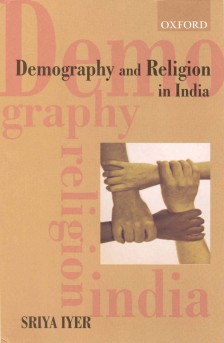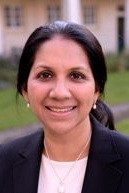Demography and Religion in India by Sriya Iyer
019566048x, 215 x 140 mm, 288 pp., 2002
 This book examines the role of religion on population growth in India. The key question that it asks is this: Do religious beliefs significantly affect demographic behaviour?
This book examines the role of religion on population growth in India. The key question that it asks is this: Do religious beliefs significantly affect demographic behaviour?
The volume examines the theological content of Islam and Hinduism in the context of population growth. It also offers evidence that religious differences in fertility and two of its proximate determinants, contraceptive choice and the age at marriage, are in fact, due to differences in socio-economic characteristics, such as access to education.
The econometric analysis is based on fieldwork carried out among Hindu, Muslim, and Christian women in a cluster of communities in the south Indian state of Karnataka. The determinants of women's age at first marriage, their contraceptive choices and their fertility are modelled and then analysed, drawing inferences for population policy.
Using an inter-disciplinary framework, this book richly contributes to the debate about the consequences of religion for fertility differentials, and provides valuable insights for policy-makers in countries characterised by religious pluralism.
Demographers, economists, development researchers, gender specialists, and anthropologists will find this book enriching and thought-provoking.
Sriya Iyer is a Newton Trust Lecturer at the Faculty of Economics, and a Fellow of St. Catharine's College, University of Cambridge, England.
'This is an exceptional work, at the interface of economics, demography, and anthropology. Iyer has sought evidence of the influence of religious culture on fertility behaviour, as exemplified by age of marriage for women, fertility rate, and the desire for children…this book should be an entry point for anyone intending to study the question of religion, economic circumstances, and fertility behaviour.'
- Partha Dasgupta, University of Cambridge
'Interpreting her imaginative fieldwork in the light of anthropology, econometrics, law, and the study of religions, Sriya Iyer brilliantly advances our understanding of fertility differences. In her survey, neither characteristics affecting fertility nor fertility behaviour for a given set of characteristics differ significantly between Hindus and Muslims. Yet, Muslim women average about one child more than Hindu women! This seems contradictory, but Sriya Iyer skilfully resolves the paradox. In so doing, she contributes something quite new to our grasp of 'what works and what fails, and why' in population policy.' - Michael Lipton, University of Sussex

